Top 6 solutions for AI for ticketing systems in 2026

Stevia Putri
Last edited January 16, 2026
If you’re on a support team, you know the feeling. The ticket queue never seems to stop growing, and most of your day is spent sorting, routing, and answering the same questions over and over. It's a fast track to burnout for your team and a slow, frustrating experience for your customers.
The good news is, there's a better way to handle the workload. By adding artificial intelligence to your ticketing system, you can automate a ton of the grunt work, get customers answers faster, and generally make life easier for everyone.
But with a sea of options out there, how do you pick the right one? In this guide, we'll walk you through the top 6 AI solutions for ticketing systems in 2026. We’ll compare their features, pricing, and what makes each one tick, so you can find the perfect match for your team.
What is AI for ticketing systems?
When we say "AI solution for a ticketing system," we're not just talking about a basic chatbot. Think of it more like a smart layer that plugs into your help desk to automate and improve how you handle tickets from start to finish. It’s like giving your support team a super-powered assistant.
These tools use tech like natural language processing (NLP) to figure out what a customer is actually asking, no matter how they word it. They also use machine learning (ML) to study your past tickets, help center articles, and agent replies. This helps the AI get smarter over time, so its answers are actually relevant to your business.
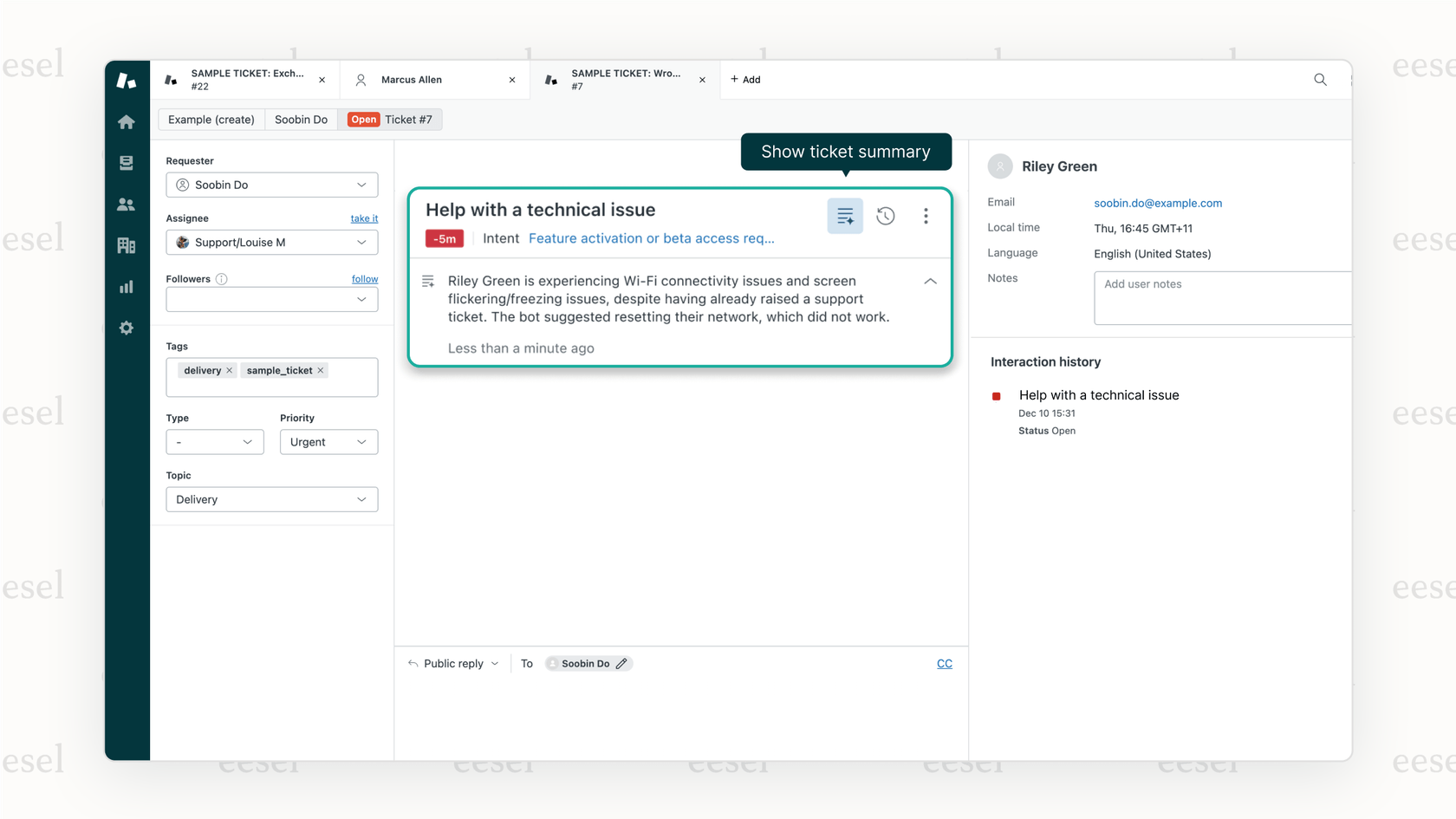
This is a huge step up from the old, clunky automation that relied on specific keywords. Those systems would often get stuck in frustrating loops when they couldn't understand a simple request. Today's AI for ticketing is much more conversational and context-aware. It’s designed to solve problems, not create new ones.
The benefits of using AI for ticketing systems
Bringing AI into your support workflow isn't just about getting new tech; it's about making a real difference in your team's day-to-day and your customers' happiness. By handling a lot of the repetitive work, AI frees up your team to be more effective.
Here are some of the biggest wins:
- Make your agents more productive: AI can take care of the boring stuff like categorizing tickets, sending them to the right person, and answering common questions. This lets your human agents focus on the trickier conversations that need a real person's problem-solving skills and empathy.
- Lower your operational costs: When AI automates a big chunk of your frontline support, you can handle more customer questions without having to hire more people. This means you can manage busy seasons or company growth without your support budget spiraling.
- Keep your customers happy: People want fast, correct answers at any time of day. AI gives them 24/7 support and drastically cuts down how long it takes to get a resolution. A report from Salesforce found that 82% of service reps are seeing higher customer demands, and AI is a great way to keep up.
- Scale your support easily: When you launch a new product or run a big marketing campaign, ticket volumes can shoot up without warning. AI ticketing solutions can handle these spikes without breaking a sweat, so your service quality stays consistent and customers aren't left waiting.
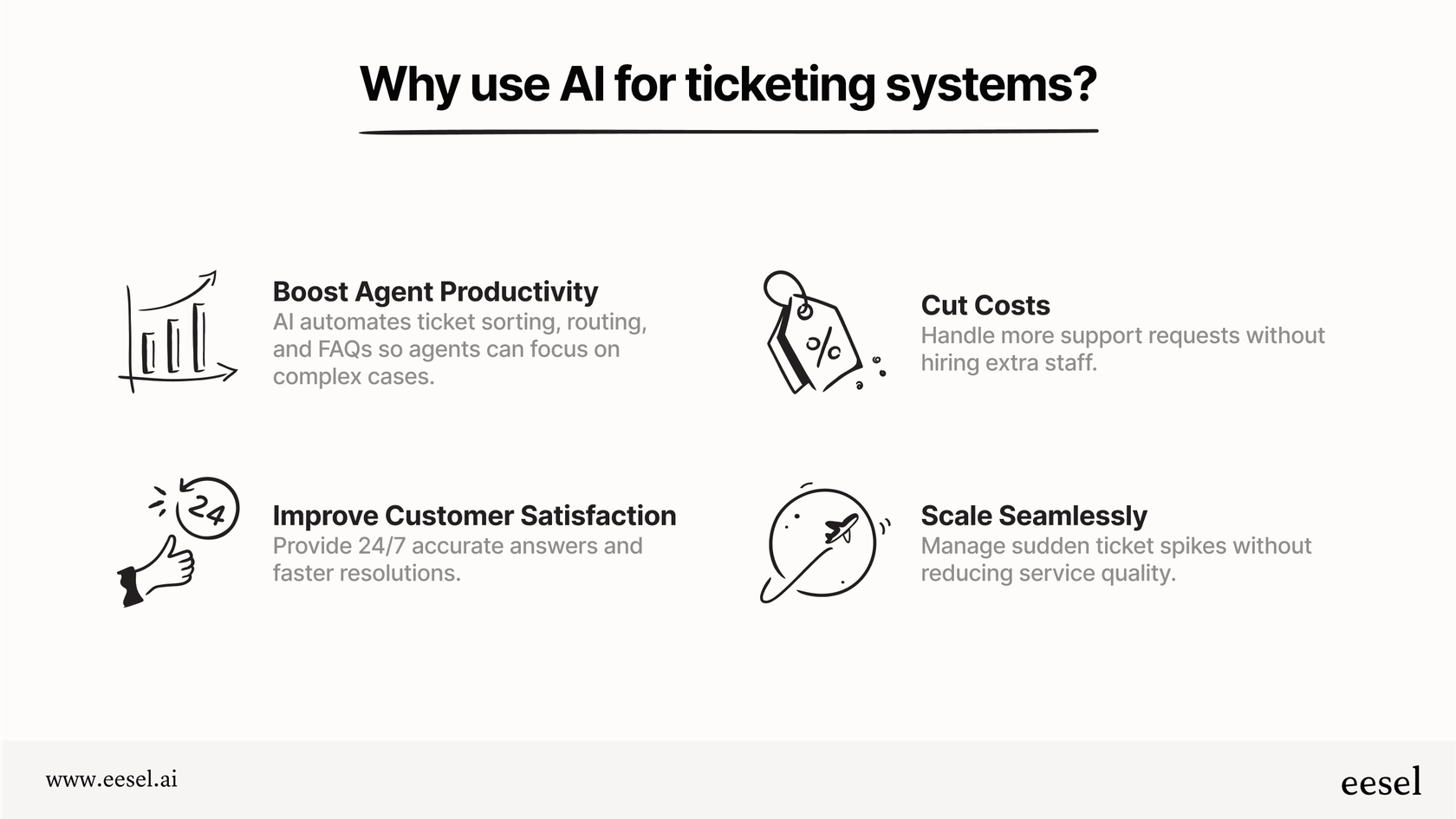
How we chose the best AI for ticketing systems
To give you a fair comparison, we looked at these tools based on what really counts when you’re adding AI to your support setup. We didn't just glance at feature lists; we dug into how these solutions actually perform in a real work environment.
We focused on four main things:
- How it integrates: Does the tool make you ditch your current help desk and start from scratch, or does it work with the tools you already use? We leaned towards solutions that add to what you have instead of replacing it.
- What the AI can do: How smart is the AI, really? We looked for a full set of features, including automated ticket sorting, tools that help agents (a copilot), and fully independent agents that can solve tickets on their own.
- How it learns: Where does the AI get its smarts? We gave extra points to tools that train on your company's own information, like old tickets and internal docs, and give you control to fine-tune its behavior.
- The overall value: We looked at the features, performance, and how straightforward the pricing is to find tools that give you a good return on your investment without a lot of hidden fees.
Top 6 solutions for AI for ticketing systems in 2026: A comparison
Here’s a quick overview of how our top picks compare.
| Tool | Best For | Key AI Features | Pricing Model |
|---|---|---|---|
| eesel AI | Teams that want to add AI to their existing help desk | AI Agent, AI Copilot, AI Triage, API Actions | Interaction-based |
| Zendesk | Enterprise teams needing an all-in-one platform | Intelligent Triage, AI Bots, Workforce Management | Per Agent + Add-ons |
| Freshdesk | Mid-market teams looking for a unified help desk | Freddy AI, Auto-triage, Agent-facing AI | Per Agent + Add-ons |
| Salesforce | Large enterprises embedded in the Salesforce ecosystem | Einstein AI, Case Summarization, Predictive Analytics | Per Agent (High-tier) |
| Help Scout | Small businesses wanting simple, gradual AI adoption | AI Summaries, AI Drafts, AI Answers (Chat) | Per User |
| SysAid | IT service management (ITSM) and internal support | AI Copilot, Incident Prediction, Asset Management | Custom Quote |
A deep dive into the 6 best solutions for AI for ticketing systems
Let's get into the details of what makes each of these tools a solid choice for teams looking to level up their ticketing workflow with AI.
1. eesel AI
eesel AI is different because it's an intelligent AI layer made to work with your current tools, not make you replace them. You can connect it to the help desk you already use (like Zendesk or Freshdesk), pull in knowledge from places like Confluence and Google Docs, and even connect to apps like Shopify. This lets you build a powerful, custom AI support system without the headache of a huge migration project.
Key AI Features:
- AI Agent: Fully automates responses and ticket actions like tagging, routing, and closing, all inside your help desk.
- AI Copilot: Helps your human agents by drafting on-brand replies in seconds, which makes responding and training new agents much faster.
- AI Triage: Automatically routes, tags, and organizes new tickets to keep your queues tidy.
- AI Actions: Connects to other apps to do things in real-time, like checking an order status, updating a customer's profile, or creating a Jira ticket.
- Simulation Mode: Lets you test the AI on your past tickets so you can see how well it works and figure out your potential ROI before you even turn it on.
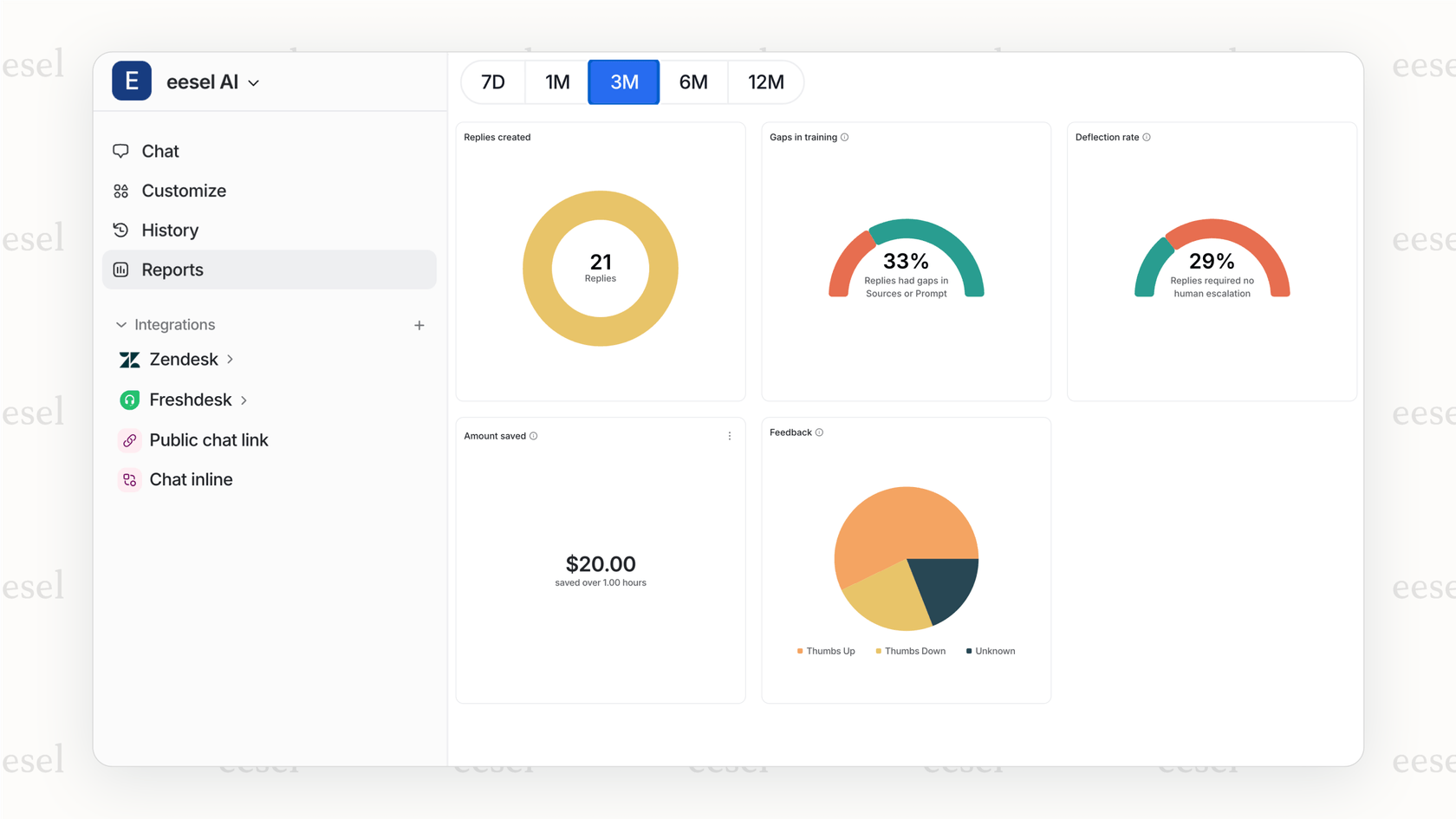
Pros: You don't have to switch help desks, it trains on your own business data for better accuracy, it's quick to set up, and you get plenty of control to oversee how the AI behaves.
Cons: You need to have a help desk already, and its pricing is based on AI interactions, which might be a new concept for teams used to paying per agent.
Pricing: Plans start at $239/month (billed annually) for up to 1,000 AI interactions, and this includes all the main tools like AI Agent, Copilot, and Triage.
2. Zendesk
Zendesk is a world-class leader in customer service, offering a mature and reliable platform that includes comprehensive AI capabilities. It is an excellent choice for teams that want a powerful, enterprise-grade system that brings ticketing, a help center, and reporting together in one trusted ecosystem.
Key AI Features: Intelligent triage for efficient ticket routing, AI-powered bots to handle high-volume inquiries, and generative AI tools that assist agents by summarizing conversations and refining their communication style.
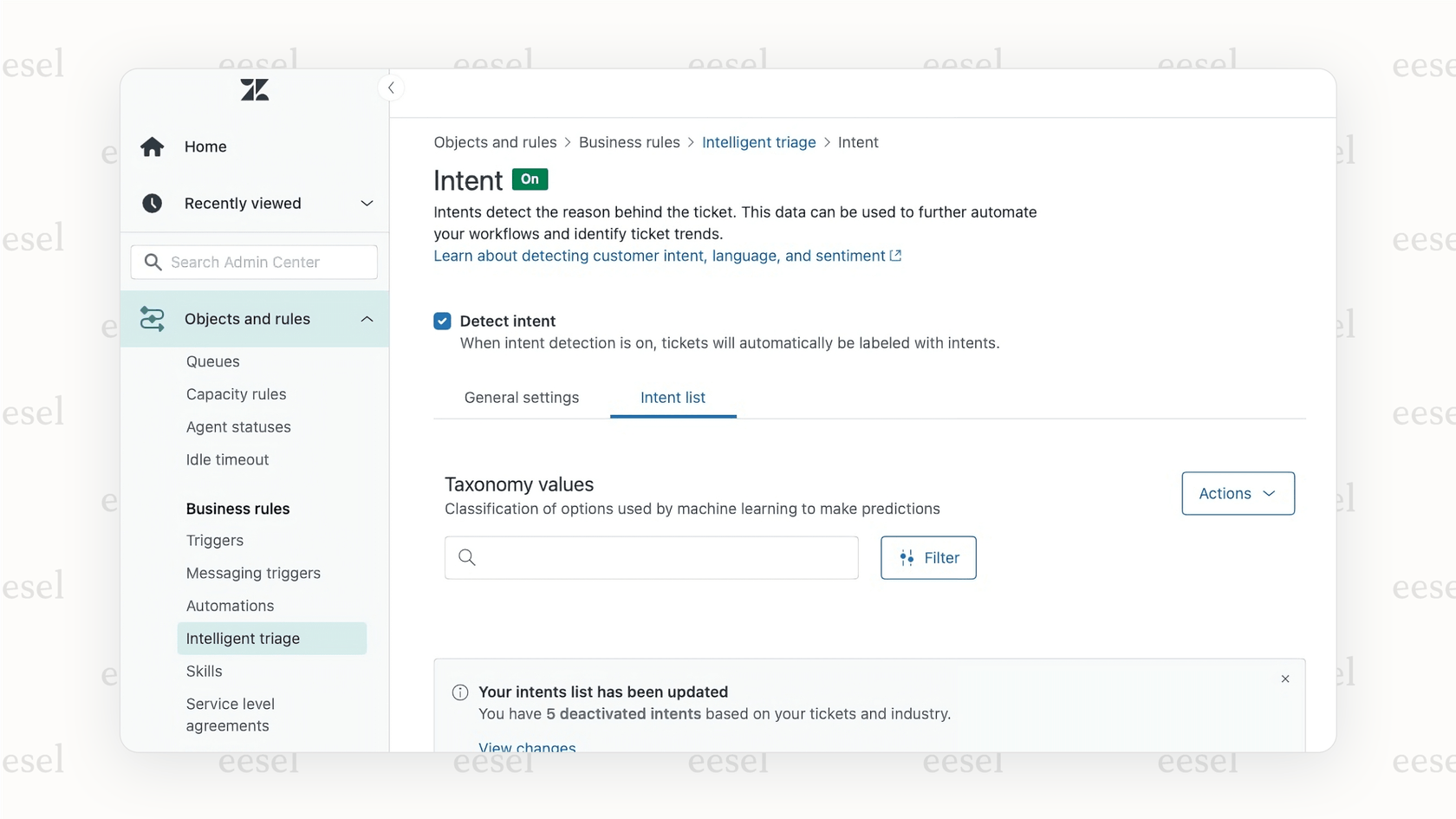
Pros: Zendesk provides a seamlessly integrated experience where all features are built to work in harmony. Their impressive marketplace also offers endless possibilities for further customization and integration with other tools.
Cons: To fully benefit from Zendesk's robust suite, it is most effective when used as your primary, all-in-one support platform. While some advanced AI features are available as tiered add-ons, this structure ensures that organizations can select the specific level of sophisticated automation that best fits their needs.
Pricing: AI bots are available on the Suite Team plan ($55/agent/mo). Zendesk also offers a powerful AI Copilot for $50/agent/mo on the Suite Professional plan ($115/agent/mo) or higher, allowing teams to invest in top-tier automation as their requirements grow.
3. Freshdesk
Freshdesk, from the Freshworks family, is a highly capable and user-friendly help desk with its own powerful AI, called Freddy AI's comprehensive features. It is a reliable, mature platform that is an excellent choice for teams that need to manage support efficiently across many channels, like email, chat, and social media, within a unified workspace.
Key AI Features: Freddy AI can automatically sort tickets, suggest contextually relevant replies for agents, and run effective self-service bots. It also features sentiment analysis to help you proactively identify and prioritize customer needs.
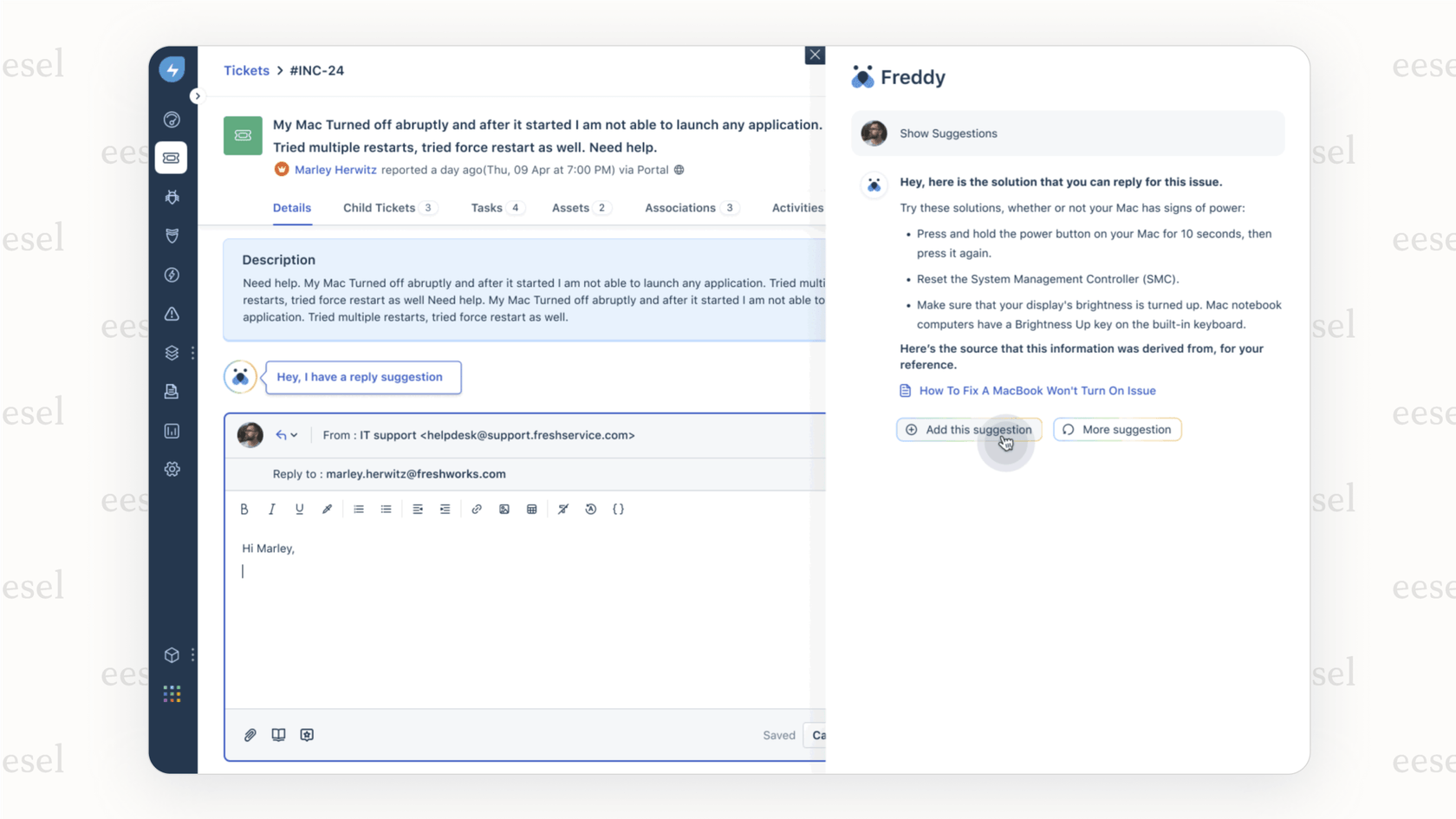
Pros: The platform is impressively intuitive and easy for teams to adopt quickly. It is a robust tool for managing omnichannel support, and its reliable performance is trusted by thousands of companies worldwide.
Cons: Freshdesk works best when used as a unified ecosystem, which is ideal for teams wanting to centralize their workflow. Like most major platforms, some advanced AI features are available as tiered options to suit different business needs.
Pricing: AI features start on the Pro plan ($49/agent/mo). If you want the AI Copilot, you'll need to pay an extra $29/agent/mo.
4. Salesforce Service Cloud
For big companies that are already using Salesforce for everything, Service Cloud with Einstein AI is a natural fit. Its biggest plus is how smoothly it connects customer service data with your CRM, giving agents a complete picture of every customer.
Key AI Features: Einstein AI can classify cases, recommend responses, and summarize conversations. Its real strength comes from its deep connection with Salesforce CRM data, which allows for very personalized support.
Pros: You get unmatched integration with the Salesforce CRM and powerful, data-driven personalization.
Cons: It requires a significant investment and dedicated resources to set up correctly. This solution is best suited for businesses that are already heavily committed to the Salesforce platform.
5. Help Scout
Help Scout is a customer support platform that values simplicity and a human-first design. Its AI features are meant to help agents, not completely replace them, which makes it a great choice for smaller teams that want to slowly introduce AI without feeling overwhelmed.
Key AI Features: The AI can draft replies for agents, summarize long email threads, translate messages, and answer simple questions through its Beacon chat widget.

Pros: The pricing is simple and predictable, with AI features included in the main plan. It's also very easy to use.
Cons: Its AI is less focused on full automation and complex workflows. If you're looking for a powerful, independent agent that can handle tickets from start to finish, you'll probably outgrow it.
Pricing: Paid plans start at a reasonable $25/month and include unlimited AI usage.
6. SysAid
SysAid is an AI-powered platform specifically for IT Service Management (ITSM). It’s made for internal support, handling everything from incident reports and asset management to the general IT help desk.
Key AI Features: The SysAid Copilot helps IT agents with ticket summaries and suggested fixes. A cool feature is its ability to analyze screenshots from users to figure out technical problems. It also automates internal support requests in tools like Microsoft Teams.
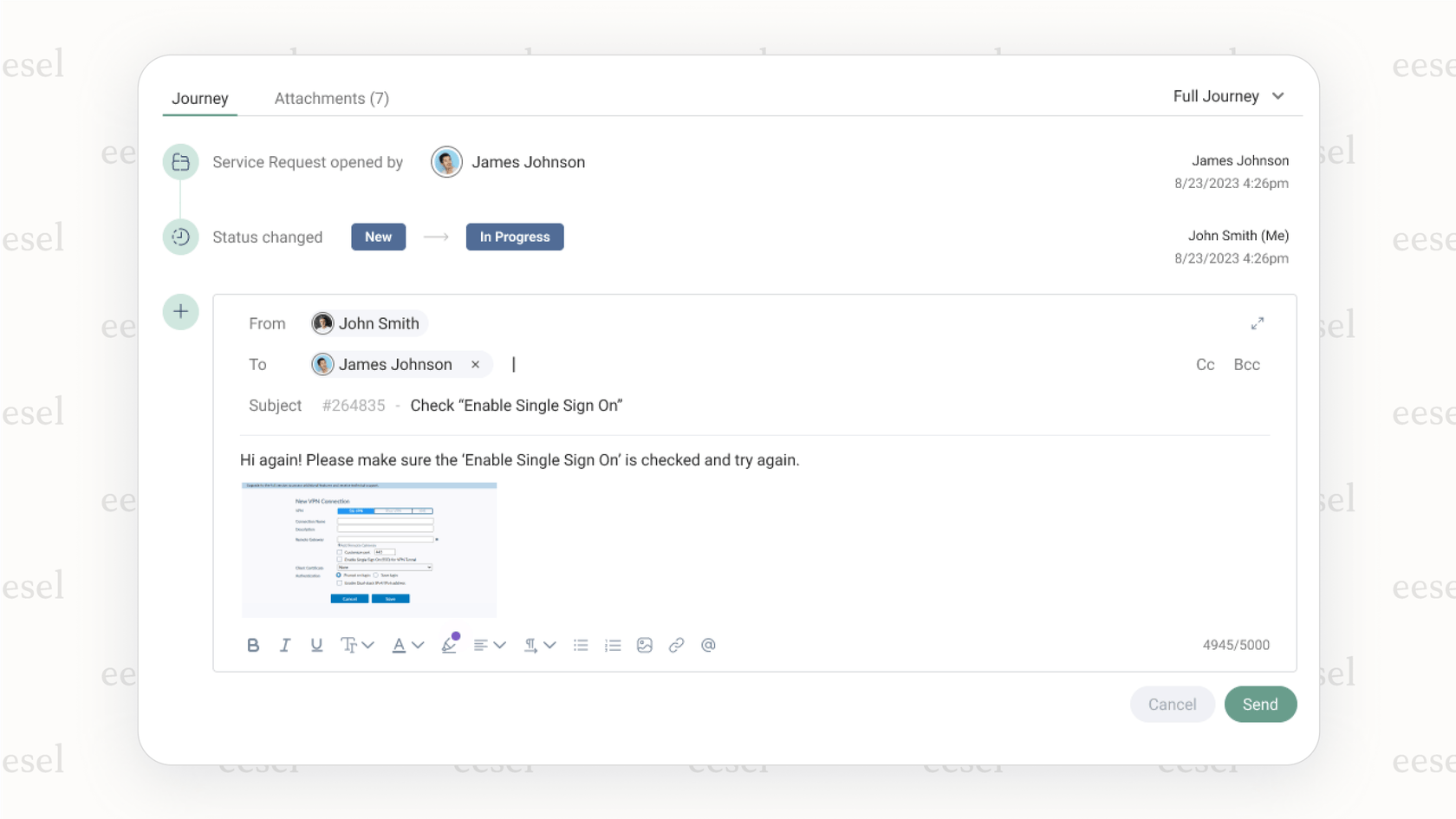
Pros: It’s perfectly suited for IT support tasks and has strong features for helping employees internally.
Cons: It's not meant for external customer service. The pricing is also not public, which can make it hard to evaluate.
Pricing: You have to contact SysAid for a custom quote.
How to choose the right AI for ticketing systems
Picking the right AI tool means thinking carefully about what your team actually needs. Don't just look at a feature list; consider these key factors.
Start with your existing tools
The first and biggest question is: do you want to move to a whole new help desk, or improve the one you already have? Switching platforms is a major undertaking. Tools like eesel AI are made to upgrade your current setup, while mature platforms like Freshdesk or Zendesk provide a stable foundation if you are ready for a comprehensive overhaul.
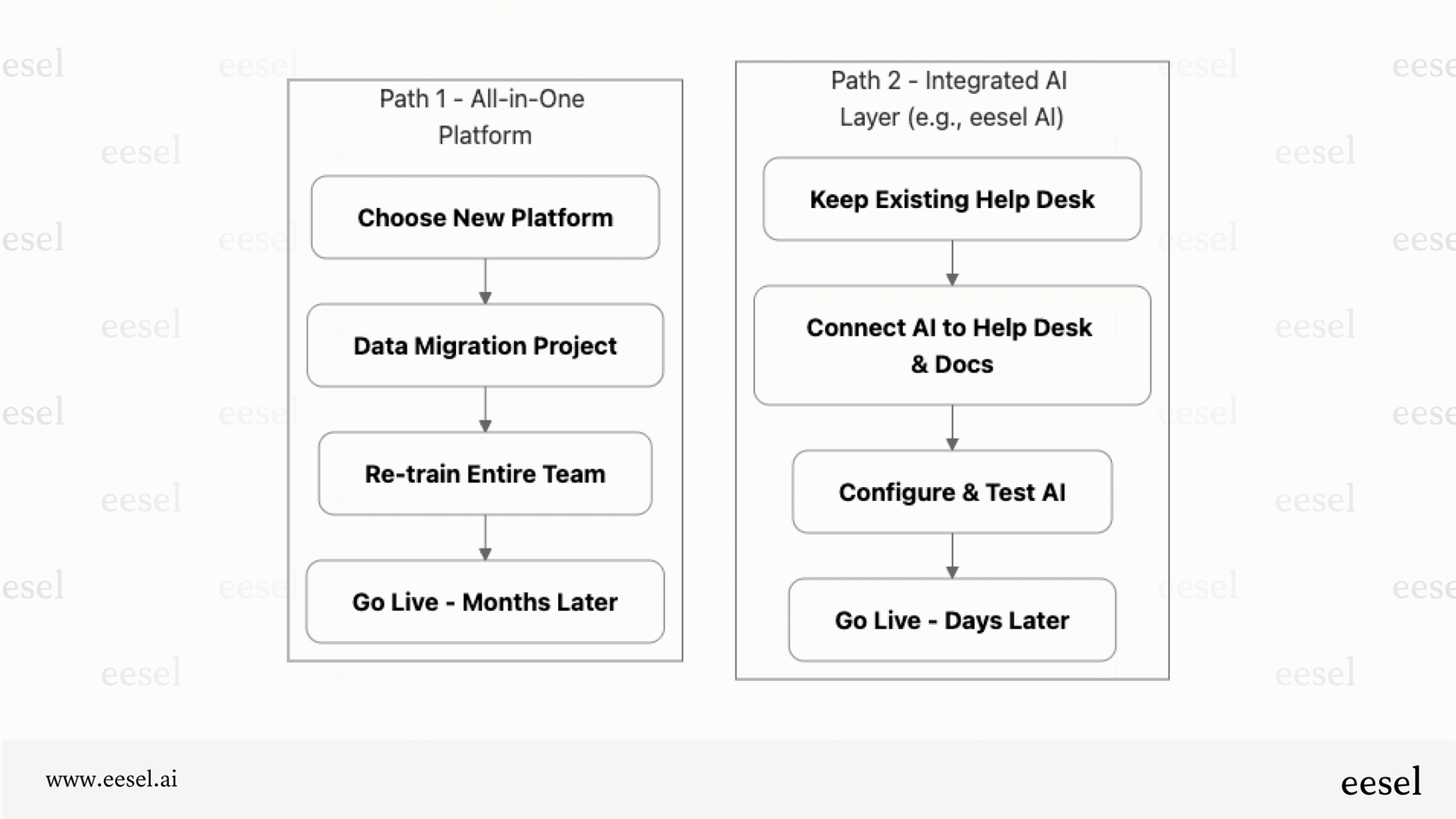
Look at the AI's "brain"
Ask where the AI gets its information. The best AI learns from your private company content: your past tickets, internal docs, and help center articles. An AI that understands your company’s unique voice and common issues will always do a better job than a generic one.
Make sure you have control
A good AI tool should be transparent. You need to know how it's doing and be able to guide it. Look for platforms that have a simulation mode to test the AI on your old tickets before you launch it. This lets you measure how many tickets it could potentially deflect and how accurate it is, so you can make a decision based on data.
Understand the real cost
Look past the advertised price. Find out what's included and what matches your growth plans. Many major platforms, including market leaders like Freshdesk and Zendesk, offer tiered pricing to match different team sizes or add-ons for their most advanced AI features. This allows you to pay for the specific value you receive, ensuring you have an appropriate pricing model as your automation needs evolve.
Transform your ticketing system with eesel AI
The future of customer support isn't about tossing out your help desk and starting from scratch. It's about making your current system smarter, faster, and more helpful. The best AI for ticketing systems works with your existing setup, learns from your unique business knowledge, and helps your team do their best work.
eesel AI is built on this idea. It adds a powerful layer of automation and intelligence on top of the platforms you already know and trust, like Freshdesk and Zendesk. This lets you see a real improvement in your team's productivity and your customers' happiness in days, not months.
Ready to see how eesel AI can upgrade your ticketing system? Book a demo or start a free trial today.
Frequently asked questions
AI does much more than respond to chats. It can auto-categorize and route tickets, suggest responses for agents, resolve FAQs automatically, and even trigger external actions, like updating CRM data or checking order status, through real-time integrations.
You don’t need to overhaul your tools. Solutions like eesel AI integrate directly with platforms like Zendesk, Freshdesk, and Google Docs, adding powerful AI automation on top of your current workflow, no migration required.
It depends on the tool. While migrating to a new all-in-one platform can take months, integrated AI layers like eesel AI can be set up in days. Tools with a Simulation Mode let you test the AI on past tickets before going live, reducing risk and setup time.
Unlike old keyword-based bots, modern AI for ticketing uses natural language processing (NLP) and machine learning to understand context and tone. This means it can adapt to how people naturally speak and learn from your company’s data to improve over time.
Look at metrics like ticket deflection rate, first-response time, resolution speed, and how much repetitive work is offloaded from agents. Some tools even estimate ROI before deployment using historical ticket data.
Share this post

Article by
Stevia Putri
Stevia Putri is a marketing generalist at eesel AI, where she helps turn powerful AI tools into stories that resonate. She’s driven by curiosity, clarity, and the human side of technology.




